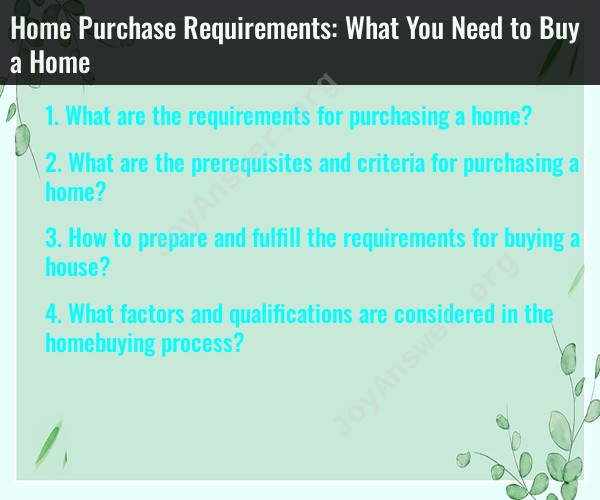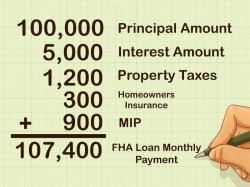What are the requirements for purchasing a home?
Purchasing a home involves several requirements and steps, and they can vary depending on your location, the type of home you're buying, and the specific circumstances of the transaction. However, here are some common requirements and steps to consider when buying a home:
Financial Preparation:
- Credit Score: Check your credit score and work to improve it if necessary. A higher credit score can help you qualify for better mortgage terms.
- Down Payment: Save for a down payment, which is typically a percentage of the home's purchase price. The amount required can vary but is often around 3% to 20% of the home's price.
Mortgage Pre-Approval:
- Get pre-approved for a mortgage. This involves providing your financial information to a lender who will assess your creditworthiness and determine how much you can borrow. Pre-approval gives you a clear idea of your budget and makes you a more competitive buyer.
Budget and Affordability:
- Calculate your budget, considering not only the mortgage but also property taxes, homeowner's insurance, utilities, and maintenance costs.
Real Estate Agent:
- Hire a real estate agent to help you find a suitable home, negotiate the purchase, and guide you through the process.
Home Search:
- Start your home search with your real estate agent's assistance. Consider factors like location, size, type, and features that matter to you.
Property Inspection:
- Once you find a home you like, schedule a property inspection to identify any potential issues or needed repairs.
Purchase Offer:
- Work with your real estate agent to make a purchase offer to the seller. This offer typically includes the purchase price, contingencies, and other terms of the deal.
Home Appraisal:
- The lender will typically require a home appraisal to ensure the property's value is in line with the loan amount.
Mortgage Application:
- After your offer is accepted, formally apply for the mortgage with your chosen lender. Provide financial documents, including pay stubs, tax returns, and bank statements.
Home Insurance:
- Secure homeowner's insurance to protect your investment and meet the lender's requirements.
Home Inspection and Contingencies:
- Address any issues that arise during the home inspection and fulfill any contingencies outlined in your purchase offer.
Closing Costs:
- Budget for closing costs, which can include fees for services such as appraisal, title search, attorney fees, and property taxes. Be prepared to pay these costs at closing.
Final Walkthrough:
- Before closing, conduct a final walkthrough to ensure the property is in the agreed-upon condition.
Closing:
- Sign the necessary paperwork at the closing meeting to complete the purchase. You'll receive the keys to your new home.
Ongoing Expenses:
- After buying the home, budget for ongoing expenses such as mortgage payments, property taxes, insurance, and maintenance.
Legal and Regulatory Requirements:
- Be aware of local and national legal and regulatory requirements for home purchases, including any specific documentation and procedures.
The requirements and steps involved in buying a home can be complex, and it's often beneficial to work with professionals such as real estate agents, mortgage brokers, and attorneys who specialize in real estate transactions. They can help you navigate the process and ensure a successful and smooth home purchase.
What are the prerequisites and criteria for purchasing a home?
Here are the prerequisites and criteria for purchasing a home:
- Credit score: Lenders will check your credit score to determine your creditworthiness. A good credit score will help you qualify for a mortgage with a lower interest rate.
- Down payment: Most lenders require a down payment of at least 20% of the purchase price of the home. A larger down payment will lower your monthly mortgage payments.
- Debt-to-income ratio: Lenders will also consider your debt-to-income ratio, which is the amount of money you owe each month compared to your income. A lower debt-to-income ratio will make it easier to qualify for a mortgage.
- Employment: Lenders will want to see that you have a steady job and income.
- Savings: In addition to a down payment, you will also need to have some savings to cover closing costs and other expenses associated with buying a home.
How to prepare and fulfill the requirements for buying a house?
Here are some tips on how to prepare and fulfill the requirements for buying a house:
- Get your credit in order. Check your credit report and dispute any errors. Pay off any outstanding debts and make sure your payments are on time.
- Save for a down payment. Aim to save at least 20% of the purchase price of the home.
- Get pre-approved for a mortgage. This will give you an idea of how much money you can borrow and what your monthly mortgage payments will be.
- Find a real estate agent. A good real estate agent can help you find the right home and negotiate the best price.
- Make an offer on a home. Once you have found the right home, you will need to make an offer. The offer will include the purchase price, the down payment, and the closing date.
- Close on the home. Once your offer has been accepted, you will need to close on the home. This will involve signing the mortgage and other closing documents.
What factors and qualifications are considered in the homebuying process?
Here are some of the factors and qualifications that are considered in the homebuying process:
- Credit score: Your credit score is one of the most important factors that lenders will consider when approving your mortgage. A good credit score will show lenders that you are a responsible borrower.
- Down payment: The amount of money you have saved for a down payment will also be considered by lenders. A larger down payment will show lenders that you are serious about buying a home and that you have some skin in the game.
- Debt-to-income ratio: Your debt-to-income ratio is the amount of money you owe each month compared to your income. Lenders will want to see that your debt-to-income ratio is low enough that you can afford to make your monthly mortgage payments.
- Employment: Lenders will also want to see that you have a steady job and income. This will help them to ensure that you will be able to make your mortgage payments in the future.
- Savings: In addition to a down payment, you will also need to have some savings to cover closing costs and other expenses associated with buying a home.
Additional tips for buying a home
- Start saving early. The earlier you start saving for a down payment, the more time your money has to grow.
- Get your finances in order. Make sure you have a budget and that you are living within your means.
- Shop around for a mortgage. Compare rates from different lenders to get the best deal.
- Be prepared to compromise. You may not find your dream home right away. Be prepared to compromise on some things, such as the size or location of the home.
- Don't be afraid to ask questions. If you don't understand something, ask your real estate agent, mortgage lender, or attorney for clarification.
Buying a home can be a daunting task, but it doesn't have to be. By following these tips, you can simplify the process and increase your chances of getting the home you want.













